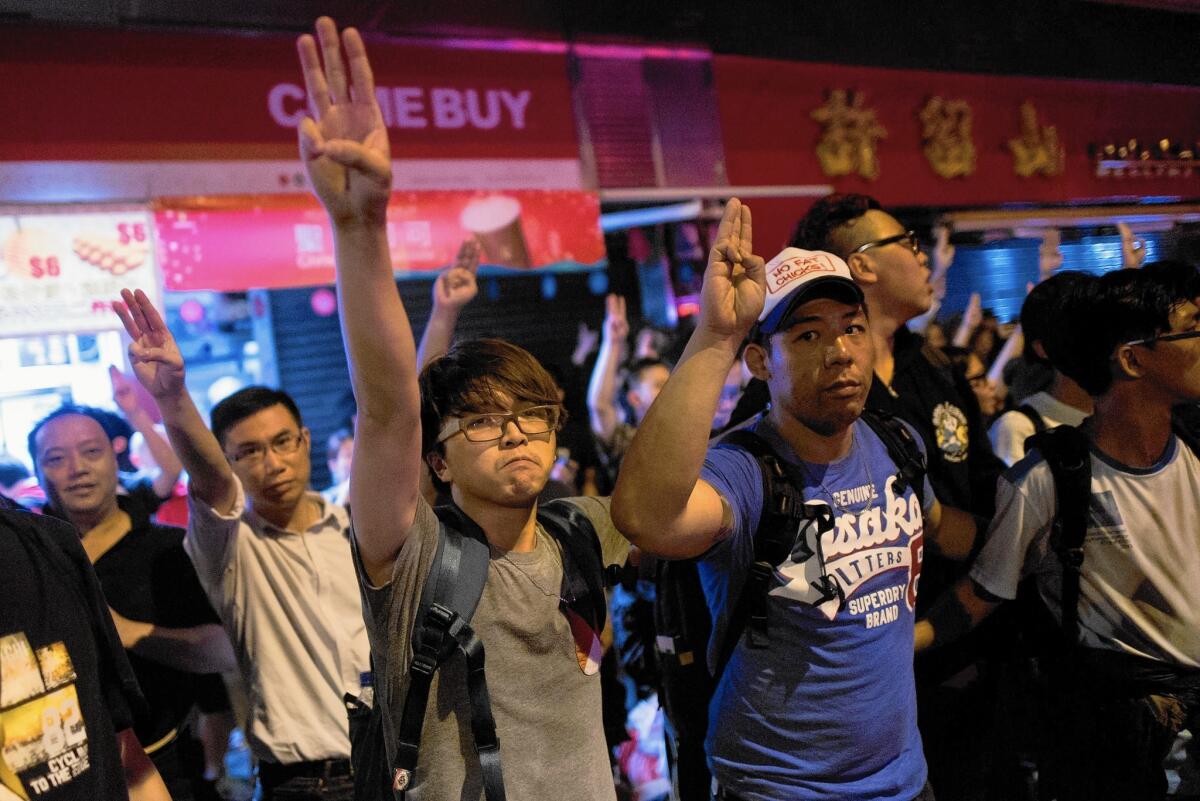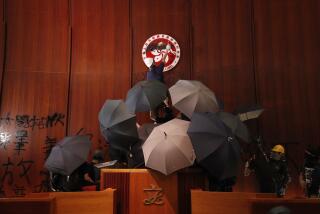Young protesters vow to maintain Hong Kong democracy movement

Hours after police forcibly dismantled the camp of pro-democracy protesters in the Mong Kok area this week, Christy Tsang was left bruised — literally and figuratively — by the setback. The 17-year-old activist said an officer had struck her with a baton.
“The police just see us as punching bags,” said Christy, a member of the Scholarism high-school group, as she limped, with bandaged knees, around the still-surviving protest encampment across Hong Kong Bay in the Admiralty district. “We must think of a new strategy, a new method to sustain our resistance.”
After weeks of stalemate and the loss of the Mong Kok stronghold, Scholarism and the college group Hong Kong Federation of Students are determined to press on with their campaign for greater democracy in the territory, even as many of their older allies are backing away from the fight and pressing the students to do the same.
The students have said they may occupy a government building as early as Sunday.
As the pro-democracy movement enters its third month, the protests are approaching a critical juncture. What was conceived as a short-lived civil disobedience act called Occupy Central with Love and Peace has morphed into a campaign sustained by the sheer will of the young generation. With the Occupy organizers, and possibly along with some pro-democratic legislators, planning to turn themselves in to authorities next week, the student groups will be shouldering the movement.
“The tide of public opinion has turned against Occupy, yet the students are adamant about standing their ground,” said Willy Lam, a political analyst and professor at the Chinese University of Hong Kong.
Recent polls showed more than 80% of respondents deem retreat by the protesters as the best way out. The younger generation, however, sees the only way out being an electoral guarantee of a democratic future for Hong Kong.
Hong Kong, a former British colony, reverted to Chinese rule 17 years ago under a framework known as “one country, two systems” that promised the territory’s residents a degree of autonomy for 50 years. Young people take up the mantle of the movement with an eye on the three decades remaining in that commitment and beyond.
“They recognize that if they don’t rise up and fight now, they won’t get anything in the future,” said Ching Cheong, a political commentator and journalist who covered the 1989 Tiananmen protest movement. “Their anxieties are entirely understandable.”
In August, the standing committee of China’s National People’s Congress laid down a tougher-than-expected framework for the city’s chief executive election in 2017, which limits the choice of candidates to two or three approved of by Beijing. This shattered hope of a democratic Hong Kong. Students launched a week-long class boycott that ushered in the Occupy movement.
After drawing massive crowds to the streets in late September and early October, the protests have diminished substantially, though a few thousand demonstrators remain encamped in the Admiralty and Causeway Bay districts.
With the Mong Kok encampment dismantled, the student leaders are urging protesters to redouble efforts to guard the remaining sites. Noting recent police attempts to block transportation of supplies to the Admiralty site, they are appealing to demonstrators to equip themselves and prepare for the movement’s next phase.
The leaders said future actions will target the government but minimize the effect on the public. Even though final examinations loom, teams of students continue to fan out and knock on doors. For them, this is like a political campaign – one in which they do their best to win back hearts and minds, even though many of young protesters can’t convince their own parents.
Starry-eyed they are not: Many of the young people acknowledge that they don’t feel hopeful about the current fight. But they say they must persevere.
“We look at the long term, beyond the present prosperity. We don’t expect everyone to understand what we’re doing, but we will remain motivated by our determination,” Christy said, taking a break from preparing first-aid kits. “Because if we leave now, what we’ve done will be all for naught.”
Law is a special correspondent.
More to Read
Start your day right
Sign up for Essential California for news, features and recommendations from the L.A. Times and beyond in your inbox six days a week.
You may occasionally receive promotional content from the Los Angeles Times.






